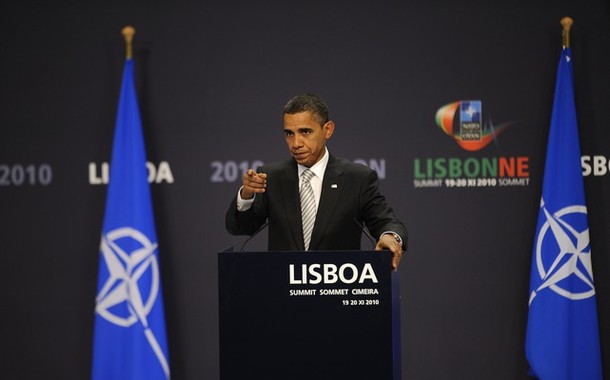
From David E. Sanger, the New York Times: In Libya, he [President Barack Obama] has committed the United States, but only from the air and only from afar. The Europeans, and some of Mr. Obama’s political opponents at home, sense a lack of commitment. Inside the White House, the opposite argument is made — that after a bruising decade of misadventures, the United States is preserving American power for the moments when truly vital interests need to be protected, while teaching the rest of the world that it will have to police its own backyards.
But is this any way to fight a war? . . .
European officials, when promised anonymity, wring their hands that this is the first NATO operation since the creation of the alliance a half-century ago in which the United States has declined to take the lead. Some former Clinton administration officials have uttered similar concerns, along with Republican critics like Senator John McCain, who made his point last week by flying into Benghazi, Libya, and visiting with the rebels, whom he immediately declared his “heroes. . . .”
Yet the question may be not whether the United States leads, but whether it puts its credibility on the line by seeming to enter the conflict half-heartedly. “The problem is the gap between U.S. objectives and what we are willing to do to accomplish them,” Richard N. Haass, the president of the Council on Foreign Relations, who left the Bush administration in part because of his objections to the drive to invade Iraq, said on Friday. “We either have to do a lot more — and the Predators were a step in that direction — or go for a cease-fire and live with the fact that Qaddafi could be in place for some time. . . .”
“We did lead — we cleared the way for the allies,” Antony Blinken, Vice President Joseph R. Biden Jr.’s national security adviser and a key player in the Libya debate, said last week. “But real leadership is successfully encouraging others to step up to their responsibilities. We’ve talked for years about burden-sharing, and either we would not let other countries act, or they wouldn’t or couldn’t do it. This time we did, and they did.”
Mr. Blinken and other administration officials insist that Colonel Qaddafi is bleeding money and running out of ammunition and allies, and that what’s needed is patience until he is eventually forced out. They make no bones about the fact that American power is limited by commitments elsewhere. “This is about the president marrying strength and wisdom and applying power in a smart way — at a time that we still have 100,000 troops in Afghanistan, and 47,000 in Iraq,” Mr. Blinken said. In other words, the message to Europe is: Thanks for the invitation, but it’s your neighborhood, your worry about refugees, and primarily your problem. (photo: Getty)
Image: getty%204%2024%2011%20Barack%20Obama%20Lisbon.jpg
